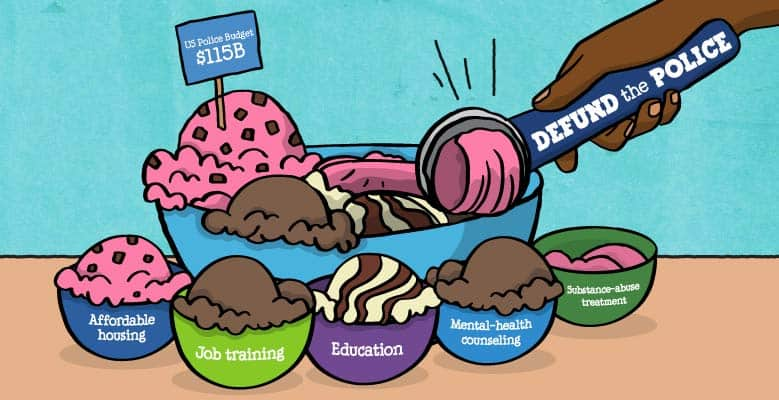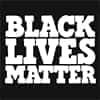June 19, 2020

Juneteenth is celebrated every year to mark the end of slavery. But while slavery may have ended on June 19, 1865, that did not usher in a new era of freedom for formerly enslaved people. Jim Crow. Mass incarceration. Police brutality. All forms of enslavement by different names. Even today, 155 years later, we know that Black men, women, and children are not fully free. They’re not free to live their own lives in their own skin, free of harassment, free of violence, and free of fear.
It’s long past time for that to change.
In the aftermath of George Floyd’s murder at the hands of police officers, we’ve been hearing calls in the streets to “defund the police.” For Juneteenth 2020, we thought we’d take a look at the “defund” movement and explain why it offers the best opportunity in generations to completely transform our model of policing and create stronger, safer communities where Black Americans and people of color can finally experience and celebrate true freedom.

Take Action Now!
What “Defund the Police” Means
“Defund the police” means that we stop spending our tax dollars on so many of the discredited, dangerous, and racist parts of policing and instead invest that money in community-driven solutions that foster real health, peacekeeping, and safety. So, rather than endlessly growing police budgets, loading up on manpower, surveillance, armor, and weapons of war, we’d increase funding for things that people really need, like:
- Affordable housing
- Job training
- Education
- Healthcare
- Mental-health treatment and counseling
- Substance-use treatment and counseling
- Childcare
- Parks and recreation
- Community centers and libraries
The “defund” movement acknowledges that police are not appropriate or effective responders to homelessness, mental illness, addiction, school discipline, or any number of issues and activities that aren’t criminal and pose no danger to anyone. In fact, relying on the police to “solve” those problems only escalates interactions, resulting in unnecessary conflict. It criminalizes behavior that would be better handled by a professional and compassionate social safety system. Enough is enough. We can’t arrest or incarcerate our way out of the challenges that face our communities. It doesn’t work. It doesn’t make us safer—but investing in our communities does.
That’s what inspired our Justice ReMix’d campaign, and since we launched it a year and a half ago we’ve worked with our grassroots partners in St. Louis to close the Workhouse jail and in Miami to hire more school counselors, and fewer police officers. We know that the only way to move forward is with a community-based model of public safety that puts people’s health and safety first.
A New Way of Ensuring Public Safety
It’s not just advocates and protesters who are demanding change—many police officers also believe that they are being asked to do things that they are ill equipped for. In 2016, then Dallas police chief David Brown said, “Every societal failure, we put it on the cops to solve.”
Not enough mental health funding? Let the cop handle it. Not enough drug-addiction funding? Let’s give it to the cops. Here in Dallas we have a loose dog problem. Let’s have the cops chase loose dogs. Schools fail—give it to the cops...That’s too much to ask. Policing was never meant to solve all those problems.
–David Brown
So, what does the end of policing as we know it look like? We think police work should be limited in scope and rooted in shared community-centered principles, including:
- Ensuring community oversight and representation
- Ending discriminatory practices like “broken windows” policing
- Turning to compassionate professionals instead of police to address noncriminal activities
- Emphasizing de-escalation and severely limiting the use of force
- Demilitarizing police departments—our neighborhoods are not battlefields
- Safeguarding transparency and accountability in all interactions and procedures
Imagine sending trained, caring professionals to help during a mental-health crisis. Imagine calling on a violence interrupter to help families in conflict. Imagine providing communities with abundant, and much-needed, housing, employment, healthcare, and transportation.

The History of Police in America
But let’s take a step back. How did we get to this point? The first organized police forces in the South were created in the 1700s as slave patrols, to hunt down escaped enslaved people. In the North, they originated in the early 1800s to control immigrants, workers, and free Black people. After the end of the Civil War, police enforced Black Codes, ensuring that, thanks to the 13th Amendment, a form of slavery could continue behind prison walls.
There is no way to separate policing from the criminalization of Black and Brown skin. Straight on through the passage of the Civil Rights Act of 1964, police departments continued to enforce segregation and laws that kept white people in a position of power. Like those slave patrols centuries ago, modern policing (right up until this very day) has its roots in anti-Black violence and white supremacy.
The Current System: Good at Racism, Bad at Solving Crimes
A comprehensive study published in 2019 found that police across the US make a total of about 10.5 million arrests every single year, aggressively pursuing drug violations (disproportionately affecting Black people) and low-level offenses. (80% of all arrests are for low-level crimes, and only 5% for crimes that involve violence.) More than 10 million arrests is a lot! But all that activity doesn’t signal effectiveness: Only 40% of victims report crimes to the police (which speaks to a lack of trust), and police only solve 25% of those reported crimes. With spending on police skyrocketing over the past six decades, you’d think it would lead to less crime and more effective investigations, but no.
American police do rank highly, though, in their use of force. As CNN puts it, “American police shoot, kill, and imprison more people than other developed countries.” And given the racism in the overall criminal justice system, it’s sadly no surprise that Black people are more at risk than white people of being killed by police. Black men are up to 3.5 times more likely than white men to be killed by law enforcement—in fact, 1 in every 1,000 Black men will die at the hands of police. Maybe this is one of the reasons that the mayor of Boston recently declared racism a public health crisis.
And for all this violence, Americans spend about $115 billion a year. New York City’s police budget, to cite just one hard-to-believe example, is about $6 billion, way way way more than the city spends on health and community services. Even in our own hometown of Burlington, Vermont, the $17.4 million spent on the police department accounts for about 22% of the city's proposed overall budget, leaving vital community programs underfunded. Does it make any sense for Americans to pay billions upon billions of dollars for a violent, racist, and ineffective system that causes so many people so much pain?
Time to Defund the Police!
Incremental reforms. Promises to do better. Increased training. We’ve tried that. But American policing is fundamentally flawed—Band-Aids won’t fix it. So it’s time to do something fundamentally different. The good news is that many states and cities have clearly heard protesters’ demands and are already working to do just that:
- School districts around the US are cutting ties with police departments, helping shut down the school-to-prison pipeline.
- Minneapolis has vowed to disband its police department.
- Mayors, governors, and other politicians are pledging to reduce police department budgets and spend the money on community services instead.
- New York just passed a law to put historic restrictions on the police.
- San Francisco will send trained experts, instead of police, to calls regarding homelessness, school discipline, mental-health crises, and other non-criminal activities.
This is a great start. But more must be done. George Floyd was murdered over a disputed $20 transaction at a grocery store. The response by the police took his life, failed his community, and made our world less safe. This Juneteenth, on what should be our nation’s true Independence Day, it’s time to liberate ourselves from a dangerous, racist model of law enforcement and work toward a new vision of building thriving communities where all people have what they need to be healthy and safe. Let’s dismantle the old system and build a new one that guarantees freedom and justice for all.

Recent Articles


